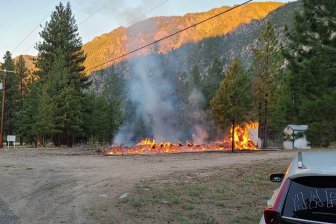More First Nations families are being separated now than during the years of residential schools — and some are still dying in government care as Indigenous children make up the bulk of Canada’s foster care system, one advocate says.

Cindy Blackstock, executive director of the First Nations Child and Family Caring Society of Canada, said the separations were a result of the federal government’s refusal to comply with a 2016 legal decision that required it to end its discriminatory provision of services.
“The federal government funds all public services on reserve and does so to lesser levels,” she said on an episode of Global News’ The West Block. “That’s been going back to Confederation.”
At the height of the system in 1953, a Truth and Reconciliation Commission report said more than 11,000 Indigenous children were in residential schools. Now, at least 14,970 out of 28,665 foster children in private homes under the age of 15 are Indigenous, federal government figures show.
Despite making up just over seven per cent of kids under the age of 14 in Canada, federal government statistics show Indigenous children account for more than half of kids — 52.2 per cent — in the country’s foster care system.
Even in 2011, former Vuntut Gwitchin Chief Norma Kassi noted: “The doors are closed at the Residential Schools but the foster homes are still existing and our children are still being taken away.”
The conditions that cause so many Indigenous kids to land in the child welfare system are “related to the intractable legacies of residential schools including poverty, addictions, and domestic and sexual violence,” according to a Truth and Reconciliation Commission report.
There, many of them face mistreatment, such as physical abuse and neglect. There are at least 14,114 maltreatment incident investigations for Indigenous children, according to the Canadian Child Welfare Research Portal’s most recently available statistics.

Roughly one-third of the investigations into the mistreatment of Indigenous children in the welfare system are due to witnessing intimate partner violence.
As these Indigenous children grow up, they’re also far more likely to be incarcerated. Indigenous adults accounted for 31 per cent of Canada’s incarcerated population in 2018-19, despite making up just 4.5 per cent of the Canadian adult population.
“It’s a magnification of the trauma from residential schools,” Blackstock said.
“The last residential schools closed in 1997. That trauma echoed forward. And then these First Nations children and families had fewer public resources to be able to deal with it. But they were often judged by Canadian public who didn’t know any better… And that perpetuated the cycle of racism and the cycle of trauma.”
Her comments come as the country grapples with the discoveries of approximately 966 unmarked graves and burial sites at two former residential schools in British Columbia and Saskatchewan — and the possibility of more.
The Federation of Sovereign Indigenous Nations (FSIN) and Cowessess First Nation announced 751 bodies were found at the site of the former Marieval residential school in Saskatchewan on Thursday, while another 215 children burial sites were discovered at the former Kamloops Indian Residential School last month.
The federal government is also facing criticism for pushing back against two Canadian Human Rights Tribunal rulings, including one to compensate Indigenous children who faced discrimination.
Blackstock said this “needs to stop.”

“They’re still fighting St. Anne’s residential school survivors where they literally had an electric chair for those children, but they’re using tax dollars to fight those survivors. They need to drop that,” she said, adding the federal government has a responsibility to comply with orders to provide equitable and culturally-based services to First Nations children and families.
She continued that the role of the public is to make sure that governments implement real solutions — “because far too often [politicians] make flowery and nice statements, but they don’t change things on the ground.”
“If we really believe in justice, if we really believe in fairness, if we really believe that no child should go to school and die there either in the past or with those kids in Thunder Bay, then we have to hold our federal and government officials accountable of all political parties,” Blackstock said.
Disclaimer: Anyone experiencing pain or distress as a result of their residential school experience can access the 24-hour, toll-free and confidential National Indian Residential School Crisis Line at 1-866-925-4419
An additional crisis line has been set up for local community members in light of this news, and can be reached at 306-522-7494.
— with files from Global News’ Rachel Gilmore
© 2021 Global News, a division of Corus Entertainment Inc.
More Indigenous family separations now than during residential schools, advocate says - Global News
Read More



No comments:
Post a Comment